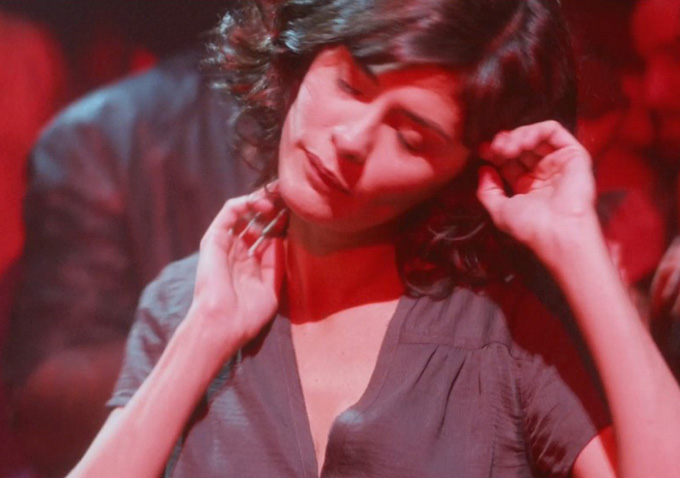 At the start of "Delicacy", we meet two lovers, Nathalie (Audrey Tatou) and Francois (Pio Marmai). They are at play, re-creating the memories of their first encounter at a smoky French restaurant, where he gambled as to what she would order, making his move when she proved his thoughts correct. It's the image Francois already had of his future paramour, and, "Delicacy" argues, the one that mattered the greatest. What is love if not a permanent feeling for a temporary state?
At the start of "Delicacy", we meet two lovers, Nathalie (Audrey Tatou) and Francois (Pio Marmai). They are at play, re-creating the memories of their first encounter at a smoky French restaurant, where he gambled as to what she would order, making his move when she proved his thoughts correct. It's the image Francois already had of his future paramour, and, "Delicacy" argues, the one that mattered the greatest. What is love if not a permanent feeling for a temporary state?
"Delicacy" makes its more audacious points about the permanence of relationships through a fairly aggressive manner, showing the couple happy in each others' arms one moment, and finding Nathalie at Francois' funeral the next. Hit by an oncoming vehicle, Francois' death never becomes any more of an abstraction; we never learn the identity of the perpetrator as Nathalie immediately steps into a ghost world, uncertain how to grieve. He's still here, she argues with herself. He'll always be here. With very little time missed, Nathalie steps right back into her place of work, even as her lecherous boss has eyes for her ample posterior.
 Nathalie's illusion keeps her from crumbling into a puddle of tears, but just barely, and as she glides through her workday activities, she merely forgets about her outside world, letting hours fade away as she pursues the upward momentum of her office projects, of which she runs point. Turning strictly into an alpha female, she powers ahead through her loneliness, her head in the mud, until her loneliness manifests in the most bizarre of manners, locking lips with a shlumpy co-worker whom she hadn't even noticed.
Nathalie's illusion keeps her from crumbling into a puddle of tears, but just barely, and as she glides through her workday activities, she merely forgets about her outside world, letting hours fade away as she pursues the upward momentum of her office projects, of which she runs point. Turning strictly into an alpha female, she powers ahead through her loneliness, her head in the mud, until her loneliness manifests in the most bizarre of manners, locking lips with a shlumpy co-worker whom she hadn't even noticed.
Markus is a tall, slouching hunchback-type with an uneasy smile and an elaborate bald patch on his skull. As played by the unassuming Francois Damiens, he is no doubt a peculiar match for the coquettish Tatou. It's a difference noted by both parties, and while Nathalie's memory of the kiss fades away almost instantly, it becomes an event for lonely Markus. Her show of affection becomes a catalyst: he says why not, and pursues the superficially-unapproachable Nathalie, knowing that at worst, he'll always have that kiss.
 Nathalie opens her heart to this charming lightweight, accepting him as a beta male counterpart to her lost lover. The issue, of course, is whether Markus can make Nathalie forget about Francois. David Foenkinos, who wrote the book upon which the film is based and wrote and co-directed with his brother Stephane, argues that Markus can only find a home inside Nathalie's head, next to her memories, whether they be of childhood or of her late husband. Some holes can't be filled, the film argues, but they can be partially accounted for.
Nathalie opens her heart to this charming lightweight, accepting him as a beta male counterpart to her lost lover. The issue, of course, is whether Markus can make Nathalie forget about Francois. David Foenkinos, who wrote the book upon which the film is based and wrote and co-directed with his brother Stephane, argues that Markus can only find a home inside Nathalie's head, next to her memories, whether they be of childhood or of her late husband. Some holes can't be filled, the film argues, but they can be partially accounted for.
Unfortunately, the picture yields more to Nathalie's grief than to the romantic aspect. There's a wheel-spinning frustration to Nathalie's refusal to accept a new man in her life. And as quiet as his character may be, Markus doesn't seem to have much of an inner life before this kiss, as the film seems to define him in relation to Nathalie, not necessarily as his own independent person. At a certain point, he's only a puppy-eyed prop to bring Nathalie out of her own sadness. Can you blame the Foenkinos brothers? After all, Tatou, her impish smile in full bloom, is the star. As much as we want to see her triumph, she is the only real presence, and only well-written character, for us to watch. And it's fairly easy to watch someone overcome their sadness when the camera loves them. Markus never stood a chance. [B-]

